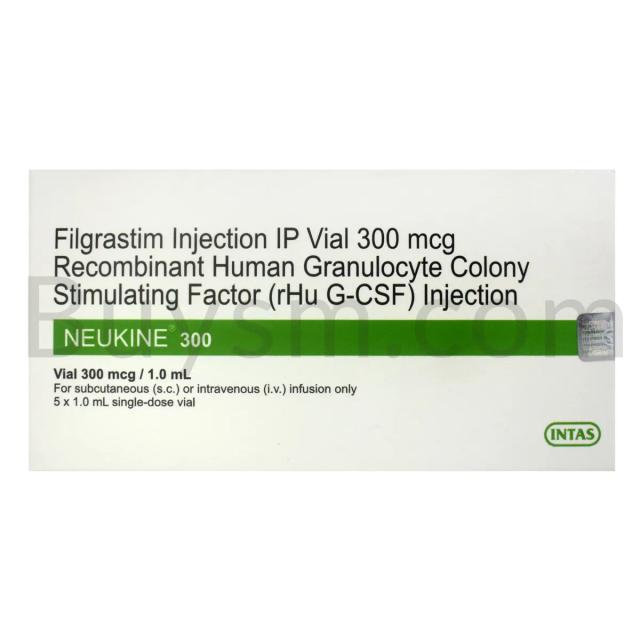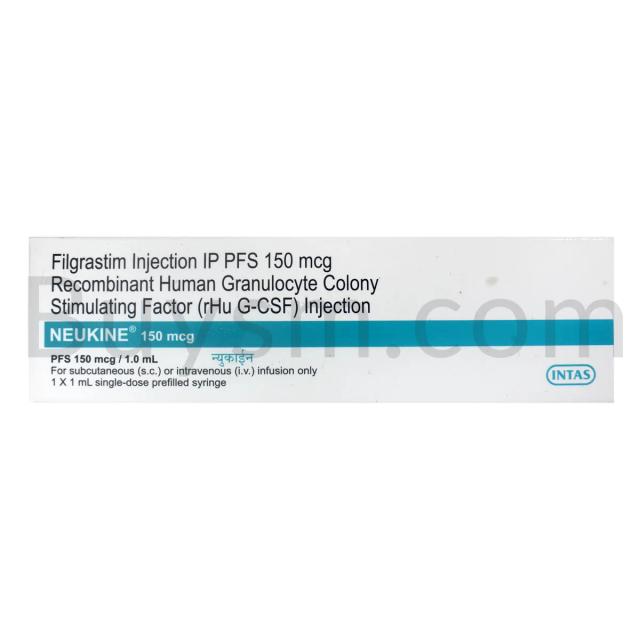

Emgrast 300 mcg Injection | 300 mcg in 0.5 ml PFS
- Manufacturer/Marketed By
Emcure Pharmaceuticals Ltd
- Active Pharmaceutical Ingredient
Filgrastim 300 mcg
(Inclusive of all taxes)
Introduction of Emgrast 300 mcg Injection
Emgrast 300 mcg Injection is an analogue of human granulocyte colony-stimulating factor (G-CSF). It stimulates the growth of white blood cells and helps reduce the risk of infections in patients undergoing chemotherapy for cancer. Patients with blood disorders are not recommended to take this medicine.
Emgrast 300 mcg may cause some common side effects, such as weakness, bone pain, rash, bone pain, and frequent pain or redness at the injection site. However, tell your doctor if you develop a lump, swelling, or bruise that doesn't go away. This medication may not protect against all types of infections. Tell your doctor or healthcare provider if you experience fever, chills, rash, sore throat, or swelling of the face or neck.
Many other medications may interact with this medication, so talk to your doctor. Emgrast 300 mcg is not prescribed to pregnant or breastfeeding women. To avoid pregnancy, effective contraception must be used during treatment. Drink lots of fluids to keep away from dehydration
Filgrastim Injection 300 mcg will be given to you by a doctor or nurse in a hospital or clinic. Your doctor or nurse will decide what dose you need and how often you should take it. This depends on why you are being treated and may change from time to time. It should be taken exactly as directed by your doctor. If taken incorrectly or in excess, very serious side effects can occur. It might also additionally take numerous weeks or months before you observe or experience the blessings of this medication. However, do not stop taking it unless your doctor tells you to. You should avoid alcohol, as it can increase the risk of liver damage. Do not touch this product Emgrast Injection yourself.
Uses of Emgrast 300 mcg Injection
Patients with Cancer Receiving Myelosuppressive Chemotherapy: Emgrast Injection is used to reduce the incidence of infections manifested by febrile neutropenia in patients with non-myeloid malignancies receiving myelosuppressive anticancer drugs associated with a significant incidence of severe neutropenia with fever.
Patients with Acute Myeloid Leukemia Receiving Induction or Consolidation Chemotherapy: G-CSF Injection Emgrast is indicated to shorten the time to neutrophil recovery and duration of fever after induction or consolidation chemotherapy in patients with acute myeloid leukemia (AML).
Patients with Cancer Undergoing Bone Marrow Transplantation: Filgrastim Injection 300 mcg is indicated to shorten the duration of neutropenia and the clinical sequelae associated with neutropenia, e.g., febrile neutropenia, in sufferers with non-myeloid malignancies present process myeloablative chemotherapy, accompanied by bone marrow transplantation.
Patients Undergoing Autologous Peripheral Blood Progenitor Cell Collection and Therapy: Emgrast Injection is indicated for the mobilization of autologous hematopoietic progenitor cells into the peripheral blood for collection by leukapheresis.
Patients with Severe Chronic Neutropenia: Emgrast 300 mcg is indicated for chronic administration to reduce the frequency and duration of sequelae of severe neutropenia (e.g., fever, infection, oropharyngeal ulcers) in symptomatic patients with congenital neutropenia, cyclic neutropenia, or idiopathic neutropenia.
Benefits of Emgrast 300 mcg Injection
Emgrast 300 mcg Injection is designed to stimulate the production of white blood cells, which are an important part of the body's immune system. By attacking and eliminating harmful bacteria and viruses, white blood cells help protect the body from infection and disease. By increasing the amount of white blood cells in the body.
Emgrast 300 mcg may help reduce the risk of infection in people with neutropenia. Neutropenia is a condition characterized by a low number of neutrophils, a type of white blood cell.
Emgrast 300 mcg Injection helps reduce the duration of neutropenia and neutropenia-related hospitalizations in people receiving chemotherapy for cancer. It may also be used to reduce the incidence of febrile neutropenia, which is a potentially serious complication of chemotherapy that is associated with fever and a low white blood cell count.
Overall, the main benefit of Emgrast 300 mcg Vial is its ability to help boost the body's immune system and protect it from infection.
Side Effects of Emgrast 300 mcg Injection
Like all medicines, Emgrast 300 mcg may cause side effects which do not require medical attention and which will disappear as your body adjusts to the medicine. Tell your doctor if they persist or if you're worried about them.
Most Common Side Effects of Emgrast 300 mcg Injection
- Oropharyngeal pain
- Hair loss
- Fatigue
- Diarrhea
- Constipation
- Decreased appetite
- Cough
- Breathing problems
- Injection site reactions (pain, swelling, redness)
Common Side Effects of Emgrast 300 mcg Injection
- Bone pain
- Weakness
- Headache
- Rash
- Nausea
- Increased lactate dehydrogenase level in blood
- Vomiting
- Increased uric acid level in the blood
How to Use Emgrast 300 mcg Injection?
Emgrast 300 mcg Injection is administered by a healthcare professional or nurse in a hospital or clinic setting. The specific dosing and administration of Filgrastim Injection 300 mcg will depend on the clinical condition of the patient's age and medical history and other factors. Kindly do not self-administer now.
How Emgrast 300 mcg Injection Works?
Emgrast 300 mcg Injection stimulates the production of neutrophil granulocytes, a type of white blood cell that protects the body from infection. This happens by activating cells in the bone marrow called stem cells, which are responsible for producing neutrophils and other types of blood cells. When neutrophil levels are low, the body becomes more susceptible to infection. By increasing the production of neutrophils. G-CSF Injection Emgrast helps reduce the risk of infection in people with neutropenia.
Safety Advices Emgrast 300 mcg Injection
Kidney
Safe
The use of Emgrast 300 mcg Vial is safe in patients with kidney disease. No dose adjustment of Emgrast Injection is recommended. If you notice any side effects, contact your doctor.
Alcohol
Unsafe
It is generally not recommended to drink alcohol while taking Filgrastim Injection 300 mcg. May increase the risk of liver damage. It is best to avoid or limit alcohol consumption while taking medication.
Liver
Safe
Emgrast 300 mcg is safe to use in patients with liver disease. No dose adjustment of Filgrastim Injection 300 mcg is recommended. If you notice any side effects, contact your doctor.
Driving
Safe
Emgrast 300 mcg Injection is unlikely to affect your ability to drive or use machines. If you experience side effects such as dizziness or drowsiness while taking Emgrast 300 mcg, it is important not to drive a car or operate heavy machinery until the side effects have subsided.
Breastfeeding
Unsafe
It is not known whether Emgrast Injection is excreted in breast milk. If you are breastfeeding and using Emgrast 300 mcg Injection, it is important to talk to your doctor about the possible risks and benefits of continuing breastfeeding. Your doctor can help you make the best decision for you, your health and the health of your baby.
Pregnancy
Unsafe
The use of Emgrast 300 mcg Injection during pregnancy may not be safe, as animal studies indicate that it may harm the developing fetus. However, if you are pregnant or planning to become pregnant, it is important to talk to your doctor about the possible risks and benefits of using Emgrast 300 mcg Vial during pregnancy. Your doctor can help you make the best decision for you, your health and the health of your baby.
Similar Medicines
Blood Disorder
Why customers like you choose BuySM.com?

Genuine Medicine
We maintain complete transparency in our sourcing and supply chain processes.

Secure Payments
This ensures that all data exchanged between your browser and our server remains confidential and secure

Fast Delivery
Stay informed about the status of your order with our real-time tracking feature.

Best Price & Offer
Enjoy even greater savings by taking advantage of our bundle offers.

5,000
Total Customers

15,000+
Products Sold Out

10,000+
Orders Delivered

10+
Cities










